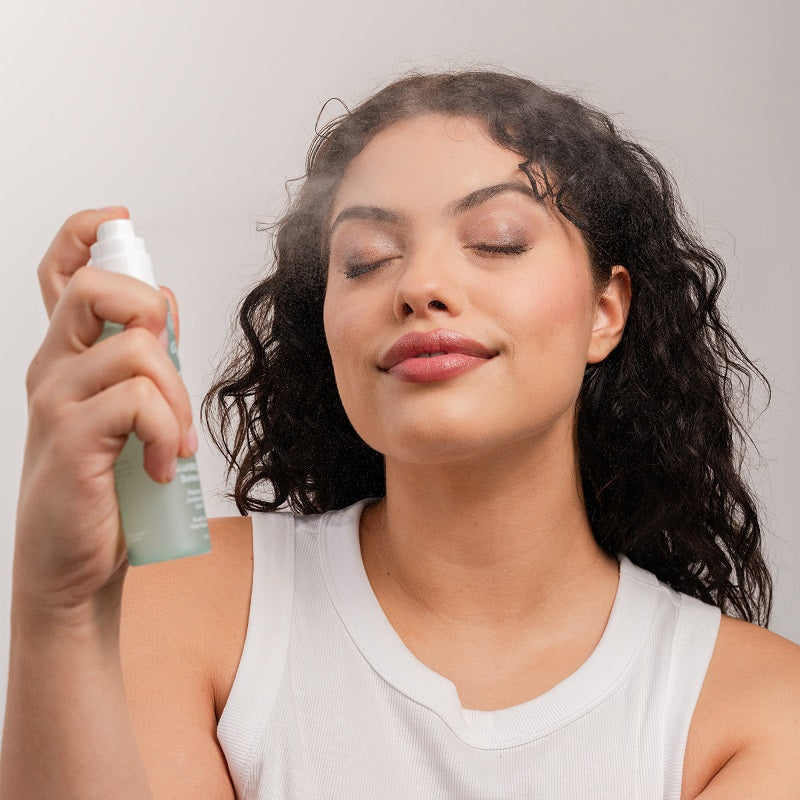
Revealing the Reality: What Does Cruelty Free Mean in Skincare?
In the world of beauty and skincare, the term "cruelty-free" stands as a symbol for consumers who value ethical practices and the welfare of animals. As we reach for our daily SPF, be it a regular sunscreen or mineral sunscreen, it's essential to recognize the impact of our choices. But, what does cruelty free mean, really, and how can our shopping habits reflect our commitment to making a difference?
As an advocate for cruelty-free products, COOLA is dedicated to providing sun protection solutions with an unwavering promise to forego animal testing. Join us as we explore what it means to be truly cruelty-free in the beauty industry, guided by our commitment to creating sunscreen that’s better for the health of your skin and the Earth.
Defining What "Cruelty-Free" Really Means
Cruelty-free skincare represents more than just a sticker on a bottle; it's a pledge towards ethical, compassionate practices within the beauty industry. For a brand to be considered cruelty-free, it must ensure that both its finished products and the individual ingredients have never been tested on animals at any stage of development.1 This global standard, which spans from the sourcing of ingredients to the sale of the final product, positions cruelty-free as a standard bearer for animal rights and conscious consumerism.
Let's dive deeper into the meaning of cruelty free, and what it entails.
A Comprehensive Commitment
For a brand to proudly wear the cruelty-free badge, it must ensure that no animal testing has occurred at any point in the product's development. This includes:
- Finished Products: The end product you see on store shelves has not been tested on animals.
- Individual Ingredients: Every ingredient that makes up the product has been developed without animal testing.
A Global Standard
Adopting a cruelty-free approach isn't restricted by geographical boundaries. The principles of cruelty-free practices apply universally, ensuring that:
- Ethical Sourcing of Ingredients: Suppliers from around the world must adhere to the same cruelty-free standards, ensuring that all components are ethically obtained.
- Sale of the Final Product: The commitment extends to the point of sale, guaranteeing that the product you purchase is part of a global effort to support animal rights.
The Pillars of Cruelty-Free Certification
Achieving a cruelty-free certification is a rigorous process. Organizations such as Leaping Bunny and PETA require brands to pass comprehensive evaluations, which include:
- Transparent Supply Chains: Brands must provide clear documentation of their supply chain to verify that no animal testing has occurred at any stage.
- Regular Audits and Checks: Undergoing periodic audits by certifying bodies to ensure ongoing compliance with cruelty-free standards.
- Renewal of Certifications: Continually renewing their cruelty-free status to reflect their current practices and any changes in their formulations or suppliers.
The Impact Beyond the Product
The ethos of cruelty-free skincare extends beyond the tangible products, fostering:
- Animal Rights Awareness: Elevating the conversation around animal welfare in the beauty industry and beyond.
- Conscious Consumerism: Encouraging consumers to make informed choices that reflect their values and the broader impact on the world.
- Innovation in Product Testing: Promoting the development and adoption of alternative testing methods that are both humane and scientifically advanced.
By defining cruelty-free in such comprehensive terms, the beauty industry takes a significant step forward in aligning its practices with the values of kindness, respect for all living beings, and a more thoughtful approach to consumerism. This commitment not only protects animals but also guides consumers towards making choices that contribute to a more ethical and sustainable world.
Spotlight on Ingredients: Navigating Cruelty-Free Skincare Choices
Committing to a cruelty-free skincare routine means keeping a close eye on the components that make up our beauty products. Active ingredients in skincare are pivotal to both our skin's health and our ethical stance, and understanding which ingredients support cruelty-free and vegan values without compromising on efficacy is key:
- Zinc Oxide: Wondering if zinc oxide sunscreen is better? This mineral sunscreen ingredient offers broad-spectrum protection without harming marine life, and it safely and effectively reflects UV rays away from the skin.2
- Titanium Dioxide: Another mineral-based component used in sunscreens and makeup for its ability to protect skin by reflecting UV rays.3
- Hyaluronic Acid: Often derived from non-animal sources, it's a hydrating ingredient that keeps skin plump and moisturized.4
- Plant Oils and Extracts: Ingredients like jojoba oil, argan oil, and aloe vera are sourced from plants and are staples in cruelty-free skincare for their nourishing properties.
- Vitamins C and E: Powerful antioxidants that help fight free radical damage. Many cruelty-free brands source these from plant-based origins.5
- Peptides: Synthetically produced to mimic natural skin processes, peptides in cruelty-free products support skin elasticity and firmness without animal-derived ingredients.6
- Ceramides: Essential for maintaining the skin’s barrier, synthetic or plant-derived ceramides are used in cruelty-free skincare to hydrate and protect the skin.7
Ingredients to Avoid for a Cruelty-Free Routine
Similar to understanding which sunscreen ingredients to avoid, while embracing cruelty-free skincare, it's equally important to know which ingredients might compromise these ethical standards. Here's a list of components to steer clear of in your beauty regimen:
- Oxybenzone and Octinoxate: For those wondering, “What is reef safe sunscreen?” these ingredients commonly found in chemical sunscreens can harm coral reefs and marine life, contradicting the ethos of cruelty-free and vegan skincare.
- Collagen: Often derived from animals, collagen is used in many anti-aging products. Look for plant-based alternatives or synthetic versions.8
- Squalene: Traditionally sourced from shark liver, it’s essential to opt for plant-derived squalane (note the "ane" ending) which is a cruelty-free alternative.9
- Glycerin: Commonly found in skincare, it can be derived from animal fat. Ensure the glycerin in your products is plant-based.10
By prioritizing these ingredients and understanding what to avoid, we can ensure that our skincare routines align with our ethical beliefs, supporting cruelty-free practices. This vigilance not only benefits our skin but also contributes to a larger movement toward sustainability and compassion in the beauty industry.
Are Vegan and Cruelty-Free the Same Thing?
Though often used interchangeably, "vegan" and "cruelty-free" have distinct meanings. Vegan products are free from any animal-derived ingredients or byproducts, while cruelty-free products highlight the absence of animal testing. Understanding this difference enables consumers to make purchases that truly reflect their ethical and environmental concerns.
Benefits of Choosing Cruelty-Free Skincare
The benefits of opting for cruelty-free products extend well beyond personal ethics, influencing environmental impact, health and safety, and ethical considerations. Cruelty-free brands typically prioritize sustainable practices, lessening the environmental footprint associated with cosmetic animal testing. Furthermore, these products are generally safer, steering clear of harmful chemicals that pose risks to human health and animal welfare.
Environmental Impact
Cruelty-free skincare plays a pivotal role in reducing environmental harm. By avoiding animal testing and often choosing natural, less harmful ingredients, these products contribute to a healthier planet. The shift towards cruelty-free and reef-safe sunscreen exemplifies how the beauty industry can safeguard our oceans and marine life.
Health and Safety
Choosing cruelty-free products can also lead to improved health outcomes. Products free from harsh chemicals and adhering to strict safety standards offer a safer alternative to conventional cosmetics, which may contain dangerous substances. This commitment to safety is particularly crucial in products like sunscreen, where effective ingredients are essential for UV protection.
Ethical Considerations
The essence of the cruelty-free movement is a profound respect for animal rights and welfare. By selecting cruelty-free, consumers support brands that refuse to compromise ethics for profit, delivering a powerful message against animal cruelty in the beauty industry. This ethical stance not only benefits countless animals but also promotes a more humane approach to beauty and skincare.
Find Vegan and Cruelty-Free Skincare with COOLA
COOLA is proudly committed to the cruelty-free movement and provides a selection of vegan and cruelty-free skincare products that protect and nurture your skin. From our acclaimed sunscreen to essential daily SPF products, our commitment to ethical practices, transparency, and safety exemplifies the industry's standard. Choosing COOLA for your skincare routine is a conscious decision to support animal welfare and environmental sustainability.
Embracing the Cruelty-Free Movement: Beyond the Label
Grasping what is cruelty free involves more than acknowledging a label; it's about making informed, ethical choices that align with our values of compassion, ethics, and sustainability. As we explore the nuances of cruelty-free and vegan products, from active skincare ingredients to the environmental advantages of reef-safe sunscreen, we become part of a broader movement toward a more ethical and humane beauty industry. Opting for cruelty-free with COOLA is a step towards a future where beauty and wellness are in harmony.
Sources:
- U.S. Food and Drug Administration. 'Cruelty-Free/Not Tested on Animals.' FDA, 29 Feb. 2024, www.fda.gov/cosmetics/cosmetics-labeling-claims/cruelty-freenot-tested-animals
- Save The Reef. 'About Reef Safe Sunscreen.' Save The Reef, 29 Feb. 2024, savethereef.org/about-reef-safe-sunscreen.html
- Environmental Working Group. 'The Trouble With Sunscreen Chemicals.' EWG, 29 Feb. 2024, www.ewg.org/sunscreen/report/the-trouble-with-sunscreen-chemicals/
- Papakonstantinou, Eleni, et al. “Hyaluronic Acid: A Key Molecule in Skin Aging.” Dermato-endocrinology, vol. 4, no. 3, 2012, pp. 253-258. doi:10.4161/derm.21923.
- "Why Is Topical Vitamin C Important for Skin Health?" Harvard Health Blog, Harvard Medical School, https://www.health.harvard.edu/blog/why-is-topical-vitamin-c-important-for-skin-health-202111102635
- Forbes, J., Krishnamurthy, K. "Biochemistry, Peptide." StatPearls. StatPearls Publishing, 28 Aug. 2023. Treasure Island (FL), 2024. https://www.ncbi.nlm.nih.gov/books/NBK562260/
- Coderch, Luisa et al. “Ceramides and skin function.” American journal of clinical dermatology vol. 4,2 (2003): 107-29. doi:10.2165/00128071-200304020-00004
- Al-Atif, Hend. “Collagen Supplements for Aging and Wrinkles: A Paradigm Shift in the Fields of Dermatology and Cosmetics.” Dermatology practical & conceptual vol. 12,1 e2022018. 1 Jan. 2022, doi:10.5826/dpc.1201a18
- Allure. 'Squalane vs. Squalene: The Important Reason Why You Should Know the Difference Between the Two Skin-Care Ingredients.' Allure, 29 Feb. 2024, www.allure.com/story/squalane-vs-squalene-skin-care-difference
- Environmental Working Group. 'EWG's Skin Deep - Glycerin.' EWG, 29 Feb. 2024, www.ewg.org/skindeep/ingredients/702620-GLYCERIN/




